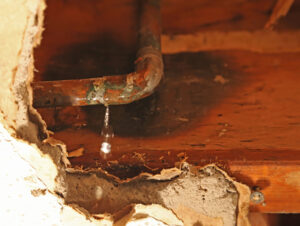
There are serious risks to ignoring a leaking pipe, so it’s important to know how to address it.
Leaking pipes may seem like minor inconveniences, but they can lead to serious, costly damage if left unchecked. While a small drip or occasional leak might seem harmless, the risks of ignoring a leaking pipe go far beyond a bit of wasted water. From structural damage to health hazards, the potential consequences are substantial.
The Hidden Dangers of a Leaking Pipe
Water Damage and Structural Integrity
One of the most immediate threats posed by a leaking pipe is water damage. Even a slow, steady drip can saturate walls, floors, and ceilings, leading to water-stained drywall, damaged floorboards, and warped cabinetry. Over time, water accumulation can also weaken a building’s structural integrity. Wood and drywall can rot, compromising the stability of beams, joists, and other foundational components. This can result in costly repairs, and in severe cases, it may require extensive structural rehabilitation to restore safety.
Mold and Mildew Growth
Moisture from leaking pipes creates the perfect environment for mold and mildew to thrive. Mold doesn’t just damage surfaces; it poses health risks, particularly for individuals with respiratory issues, allergies, or weakened immune systems. Symptoms like coughing, sneezing, skin irritation, and even severe respiratory issues can develop in environments where mold grows unchecked. Addressing mold that results from pipe leaks can be a time-consuming and expensive process, involving professional mold remediation services.
Electrical Hazards
When water leaks into areas with electrical wiring, it creates a potentially deadly hazard. Water is an excellent conductor of electricity, and leaks in the wrong areas can cause short circuits, equipment damage, or even electrical fires. If a leak spreads near an outlet, appliance, or wiring, it increases the risk of shock or fire. This is especially dangerous in areas like kitchens, bathrooms, and laundry rooms, where plumbing and electricity are often close together.
Damage to Personal Belongings
Leaking pipes in basements, attics, or areas with stored belongings can lead to costly personal losses. Furniture, clothing, photographs, electronics, and other items can be ruined by water exposure. Additionally, the moisture can lead to mildew and mold growth on affected items, sometimes making them irreparably damaged.
How to Address a Leaking Pipe
Now that we’ve looked at the risks, let’s focus on some practical steps to address a leaking pipe.
Identify the Leak
To begin, locate the source of the leak. Look for obvious signs of water pooling, dampness, or mold around walls, ceilings, or floors. In some cases, you may hear dripping or hissing sounds near the leak. If it’s not readily visible, your water meter can help; check it, wait a few hours without using any water, and recheck it to see if any water has been used.
Turn Off the Water Supply
Once you’ve found the leak, turn off the main water supply to prevent further damage. This step is particularly important if the leak is significant. Turning off the water will minimize additional water damage and allow you to assess the situation without further leakage.
Dry the Area
To prevent mold growth and reduce immediate damage, dry out the area around the leak. Use towels, fans, and dehumidifiers to remove as much moisture as possible. The quicker you can dry the area, the lower the chance that mold will start to grow.
Assess the Damage
Examine the affected areas to determine the severity of the damage. Minor leaks may only require a small patch or tightening, while more extensive damage might need the expertise of a plumber. You should also check for signs of mold and mildew, as well as any damage to surrounding materials.
Repair the Leak
There are a few DIY solutions for small leaks, like pipe clamps, epoxy putty, or waterproof tape. However, it’s often wise to hire a professional plumber for a permanent fix. They can assess whether a simple repair will suffice or if pipe replacement is necessary, especially in older homes with aging plumbing.
Take Preventative Measures
After the immediate issue has been resolved, consider implementing some preventative measures. Insulate pipes to prevent them from freezing in colder climates, inspect plumbing fixtures regularly, and address any signs of corrosion or wear promptly. If you live in an area with hard water, installing a water softener can also help prevent mineral buildup that can cause leaks.
Call Mahon Plumbing Today
If you still have more questions regarding your plumbing, we here at Mahon Plumbing are here to help. We have been serving the wider Baltimore area since 1994, so we have 25 years of experience to back up our fantastic service! Call us at our Baltimore location at 410-766-8566 or our Pasadena location at 410-636-7944. Be sure to keep up with us on social media by following us on Facebook or Twitter.
